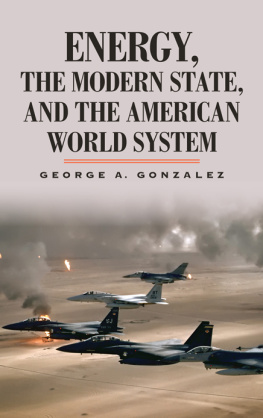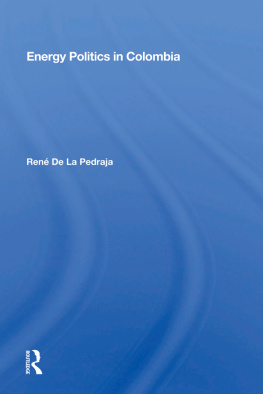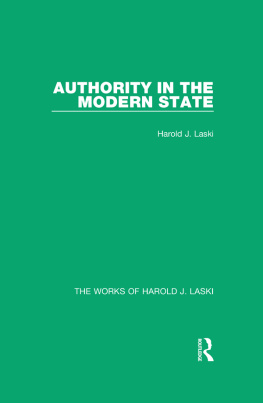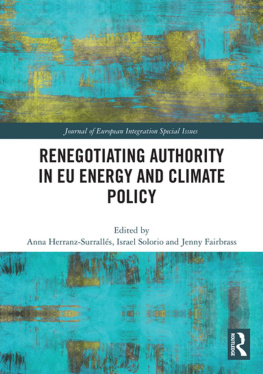Energy, the Modern State,
and the American World System
Energy, the Modern State,
and the American World System
George A. Gonzalez
Published by State University of New York Press, Albany
2018 State University of New York
All rights reserved
Printed in the United States of America
No part of this book may be used or reproduced in any manner whatsoever without written permission. No part of this book may be stored in a retrieval system or transmitted in any form or by any means including electronic, electrostatic, magnetic tape, mechanical, photocopying, recording, or otherwise without the prior permission in writing of the publisher.
For information, contact State University of New York Press, Albany, NY
www.sunypress.edu
Library of Congress Cataloging-in-Publication Data
Names: Gonzalez, George A., 1969 author.
Title: Energy, the modern state, and the American world system / George A. Gonzalez.
Description: Albany : State University of New York Press, [2018] | Includes bibliographical references and index.
Identifiers: LCCN 2017030301 | ISBN 9781438469812 (hardcover : alk. paper) | ISBN 9781438469829 (ebook)
Subjects: LCSH: Energy policyUnited StatesHistory. | Energy policyHistory. | Energy developmentPolitical aspectsUnited StatesHistory. | Energy developmentPolitical aspectsHistory. | United StatesForeign relations. | United StatesPolitics and government.
Classification: LCC HD9502.A2 G656 2018 | DDC 333.790973dc23
LC record available at https://lccn.loc.gov/2017030301
10 9 8 7 6 5 4 3 2 1
For Ileana and Alana
Contents
Theoretical Overview
In the most abstract, minimalist sense, the modern state is a result of energy (wind, coal, oil) because energy allows for the relatively inexpensive projection of political power. This creates the collaborative and affirmative union of capitalism and political authority (in the sixteenth century)which is the substance of the modern, contemporary state (). More broadly, energy serves as the basis of the modern economy. Hence, a prime function of the modern state is garnering access to energy to reliably power and grow the economy. Historically, energy is more of a zero-sum resource than capital, markets, labor, technology, therefore, a greater cause of geopolitical tension and even violence (war).
The most theoretically salient point of this volume, however, is that we cannot meaningfully understand the state as a theoretical abstraction, but only as a function of specific (energy) politics. Hence, for instance, the Nazi state can only and exclusively be understood as a response to the American turn inward in the 1920s and 1930sa policy, politics directly predicated on the U.S.s copious amounts of domestic fossil fuels (i.e., urban sprawl) ().
This explains the U.S.s historic and current hostility toward alternative sources of energysolar power (including wind), plutonium ). The successful development of either source of energy would necessitate or bring about a radical reorganization of state power at the global levelwith plutonium requiring the formation of world governmental institutions and solar/wind power bringing about a substantial diffusion of political authority.
Preface
This is my fifth book on the relationship between politics and energy. This volume was inspired by my 2016 visit to the Hanseatic League Museum (opened in 2015) in Lbeck, Germany. As I indicate later, this museum outlines how a robust capitalist economy existed in Europe prior to the rise of the modern nation-state. This realization prompted me to extend my analysis of energy politics back to the advent of the modern state. I conclude that the state is not the result of capitalism or war (as often thought), but of energy.
Energy has profoundly shaped the state and international politics since the sixteenth century. Energy politics caused both world wars, was a central factor in the Cold War, and (unsurprisingly) accounts for the global warming crisis. ). Apart from discussing the causes of the world wars, I specifically delve deeply into the American states decision to turn against plutonium in the 1970s. (This hostility was reaffirmed in 2012.) Plutonium held the promise of overcoming the key liabilities of the nation-state system. Internationalizing the global energy system (via plutonium power) could have worked to move humanity toward a world regulatory system to manage such momentous issues as conflict, weapons proliferation, and the environment (e.g., global warming).
In ).
Chapter One
Energy and the Modern State
To fully grasp the development of the modern state, we must distinguish between capitalism with a small c and Capitalism. The former describes an economy that is predicated on free market relations, credit, liquidity, advanced accounting techniques, international firms, and so on. Capitalism with a capital C is the unity of capitalism with the state. It is this unity that serves as the basis of the modern state (both historically and in the contemporary era). Why did this transition from capitalism to Capitalism occur?
The answer to this question lies in energythe shift from muscle power first to wind (in shipping) and later to fossil fuels (coal, natural gas, petroleum). The early revolutions in energy use resulted in the British Empire. Contemporary global politics is characterized by an American fossil fuel (especially oil) empire.
Early Capitalism
I recently had the privilege of visiting the Hanseatic League Museum in Lbeck, Germany. The museum effectively shows that European premodern history is not so premodern. The European economy of the late Middle Ages (1200 to 1500) had all of the accoutrements of a modern trade regime. European history prior to the sixteenth and seventeenth centuries is obscured to many of us), European capitalism began with cities and in some opposition to the aristocratic classes that would be the precursor to the modern Western state. Exactly what was premodern about Europe in the centuries leading up to the modern era was precisely that there was a bifurcation between economic and political power. European economic vibrancy was centered in cities like Lbeck, Venice, among others, but political power was invested in a landed gentry, aristocracy.
Leading cities in Europe were key centers of trade, industry, banking, and so forth. Through such devices as the Hanseatic League, urban elites regulated trade and economic activitywith the aristocracy almost entirely outside of the trade, economic, regulatory processes that dominated the continent.
In this way capitalism developed outside of the statewith the military, political apparatuses serving as something of a parasitic role (taxing an industrial, finance, and trade regime it arguably contributed nothing to). Worse still, monarchical governments in the late Middle Ages were something of a liability to the Eurasian trade regimein that a lot of the risk associated with long-distance trading came from political authorities that could arbitrarily, unduly interfere with even established trade routes. Most deleterious of all, aristocracies would go to war with one another and this could shut down trade and, by implication, economic activity. The great irony was that monarchical regimes were growing richer from increasing trade and they used that wealth to engage in conflicts that disrupted profitable activities. Moreover, war and conflict created greater need to tax wealth-creating urban zones. Hence, contrary to Charles Tillys thesis that war forwarded the creation of the state, in premodern Europe war subverted key political regimesthose of urban elites and the aristocracies that were maintained by them.











